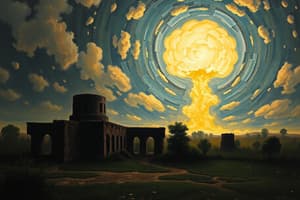Podcast
Questions and Answers
What event led to unprecedented medical challenges for doctors in Hiroshima?
What event led to unprecedented medical challenges for doctors in Hiroshima?
- A nuclear explosion (correct)
- A chemical spill
- A natural disaster
- A terrorist attack
Which symptoms were commonly observed in patients suffering from radiation sickness in Hiroshima?
Which symptoms were commonly observed in patients suffering from radiation sickness in Hiroshima?
- Joint pain and fatigue
- Cough and cold
- Bleeding, nausea, vomiting, and diarrhea (correct)
- Headaches and fever
Who penned an account of their experiences in Hiroshima just four days after the atomic bombing?
Who penned an account of their experiences in Hiroshima just four days after the atomic bombing?
- Dr. Masakazu Iwata (correct)
- Dr. Kiyoshi Shiga
- Dr. Kiyoshi Shiga's student
- An anonymous doctor
What was one of the challenges faced by doctors in treating patients in Hiroshima after the bombing?
What was one of the challenges faced by doctors in treating patients in Hiroshima after the bombing?
How did Dr. Iwata describe the scene he encountered in Hiroshima after the bombing?
How did Dr. Iwata describe the scene he encountered in Hiroshima after the bombing?
What was the name of the atomic bomb dropped on Hiroshima in 1945?
What was the name of the atomic bomb dropped on Hiroshima in 1945?
What did Dr. Iwata observe about the effects of the bombing on survivors?
What did Dr. Iwata observe about the effects of the bombing on survivors?
How did the presence of radioactive materials in Hiroshima affect medical treatment according to Dr. Iwata's observations?
How did the presence of radioactive materials in Hiroshima affect medical treatment according to Dr. Iwata's observations?
What was one significant medical challenge faced by doctors in Hiroshima as highlighted in the text?
What was one significant medical challenge faced by doctors in Hiroshima as highlighted in the text?
In the wake of the Hiroshima bombing, what new reality did the medical community have to confront?
In the wake of the Hiroshima bombing, what new reality did the medical community have to confront?
What role did collaboration among medical professionals play in treating the injured in Hiroshima?
What role did collaboration among medical professionals play in treating the injured in Hiroshima?
What does Dr. Iwata's journal entry continue to inform our understanding about?
What does Dr. Iwata's journal entry continue to inform our understanding about?
Flashcards are hidden until you start studying
Study Notes
As medical professionals, doctors bear witness to the human condition in all its complexity, from the mundane to the extraordinary. A journal entry, a reflection of a physician's observations and experiences, can reveal poignant stories of healing and resilience. In this exploration, we'll delve into a remarkable entry from the aftermath of the Hiroshima bombing, a tragic event that forever altered the course of history and medical practice.
On August 6, 1945, the world watched with horror as a single atomic bomb, "Little Boy," was dropped on Hiroshima, Japan. The effects of this attack were unprecedented, and the medical community was confronted with an onslaught of injuries and illnesses that defied conventional wisdom. In the days and weeks following the bombing, doctors raced against time to save lives and document their findings.
Dr. Masakazu Iwata, a general practitioner and a former student of Dr. Kiyoshi Shiga (the founder of Shiga toxin research), penned an account of his experiences in Hiroshima on August 10, 1945. Dr. Iwata's journal entry offers a unique perspective of the devastation caused by the bombing.
In his entry, Dr. Iwata describes a scene of panicked individuals, searching for loved ones and medical attention. Many of the patients he encountered were suffering from radiation sickness, an entirely new condition that required an innovative approach to treatment. Dr. Iwata noted that the most common symptoms included bleeding, nausea, vomiting, and diarrhea.
Dr. Iwata also observed that the effects of the bombing were not limited to physical injury but extended to the mental and emotional well-being of the survivors. He noted that survivors often showed signs of shock, depression, and anxiety, which added to their already considerable physical burdens.
The journal entry also includes valuable insights into the medical challenges faced by doctors in Hiroshima. For instance, Dr. Iwata observed that the presence of large amounts of radioactive materials in the environment led to contaminated wounds and increased the risk of infection. As a result, doctors had to adjust their treatment protocols to account for the new hazards.
Moreover, Dr. Iwata's entry highlights the importance of collaboration among medical professionals. He details the efforts of various organizations, including the Red Cross and the Japanese military, to provide medical supplies, facilities, and personnel to treat the injured. This collaboration allowed doctors to pool their resources and expertise, leading to more effective care.
In the wake of the Hiroshima bombing, the medical community was forced to confront a new reality: the consequences of nuclear warfare. As a result, doctors began to study the effects of radiation sickness and develop new treatments for its symptoms. Dr. Iwata's journal entry serves as an important reminder of the medical community's resilience in the face of adversity, and the critical role it played in shaping our understanding of the devastating consequences of nuclear warfare.
Today, the lessons learned from Dr. Iwata's journal entry continue to inform our understanding of the impact of nuclear warfare on human health. As we reflect on the events of August 6, 1945, it is essential to recognize the extraordinary efforts of doctors like Dr. Iwata, who bravely faced the challenges of the Hiroshima bombing and educated future generations about the dangers of nuclear warfare.
References: Hiroshima bombing medical history: Dr. Masakazu Iwata's journal entry, 1945 [online]. Available: [https://www.history.com/news/hiroshima-bombing-medical-history-doctor-masakazu-iwatas-journal-entry] [Accessed February 16, 2024].
Studying That Suits You
Use AI to generate personalized quizzes and flashcards to suit your learning preferences.



